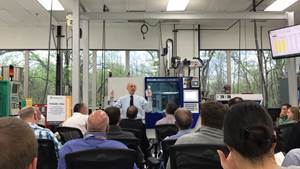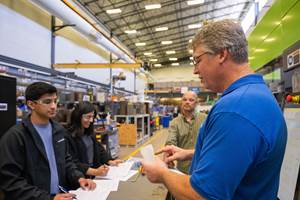ENTEK Expands Extruder Lines for Both Small Lot and High Throughput Jobs
New compounding extruders for both quick-change and high-volume applications.
Like the last NPE, ENTEK Extruder’s exhibit (Booth W5189) is furnished with a twin-screw compounding extruder—part of its QC3 series—designed in tandem with a customer. It’s also displaying its rebranded line of larger workhorse extruders—now dubbed the HR3 series—and the 73-mm on display will be shipped to an Illinois toll compounder on breakdown.
The QC3 (this stands for Quick-Change, Quick-Clean and Quality Control) at the both is a 33-mm machine that fills a gap between the 27-mm, 43-mm and 53-mm compounding extruders ENTEK has brought to the market since the commercial rollout of the series at NPE2015. “The 33-mm fits in that ‘sweet spot’ between the 27-mm and 43-mm,” says Linda Campbell, ENTEK’s director of sales. Much like the QC3 series in general, this machine was driven by a customer—in this case a materials-development company—that liked the benefits of the extruder line but was looking for something “beefier” than the 27-mm, states Campbell. Depending on the application, the 33-mm can run at rates to 800 lb/hr.
The QC3 series has been designed to accommodate an industry trend toward shorter production runs, especially in color compounding. “We saw this unfolding about eight years ago,” Campbell recalls. “Our customers started running smaller batches on a just-in-time basis because their customer didn’t want to store inventory. But they were taking up to four hours to do a color change. Downtime was a killer, so we set out to develop a series of machines that help them get back up and running as quickly as possible.”
If you stop by the booth at 11 AM and 2:30 PM, you’ll see ENTEK’s Colt McDaniel and Dean Elliott do a complete screw swap on the 33-mm in 5 min. And that’s not just trade fair showmanship. Remarks Campbell, “Customers that have a spare screw set on the shaft can absolutely change it out that fast.” The QC3 series features patented, self-aligning screw-gearbox couplings to facilitate fast and fool-proof installation of screws; lock and key feature on splined shafts to prevent screw timing errors; conveniently located gauges for quick monitoring of lube and cooling system running conditions; a quick-change strand die; a machine-mounted air-ratcheting tool; and enhanced controls.
But don’t just think of ENTEK as a builder of smaller compounding extruders, because alongside the 33-mm will be a 73-mm corotating compounder rebranded as HR3 series (for High Rate, High Reliability, High Return). This series of workhorse extruders is aimed at high-output production of bioresins, wood-plastics composites, color and more. The series runs from 53 mm to 133 mm. “Whereas the QC3 series is for customers who run shorter lots and do lots of changes, the HR3 series is for those applications where at least 80% of the time the customer is running a standard formulation,” says Campbell.
When ENTEK packs up its NPE2018 booth, the 73-mm will be shipped to BPC Toll Compounding & Blending, Meredosia, Ill. Founded in Houston in 2007 to conduct testing services for major petrochemical companies, BPC moved to Illinois in 2012 and began offering custom compounding services. Since then, its business has steadily increased to the point where the company was running at full capacity and needed to expand by adding new machinery and equipment. Once up and running, the line will allow BPC to increase its toll compounding capacity dramatically, from 22 million to 60 million lb/yr. “We have traditionally stayed under the radar, but our growth has led our owners to invest heavily in our plant,” says Greg Larson, BPC’s v.p. business development. “We’ve added staff, and are about to launch a new corporate identity. NPE2018 is a big show for us, and while we are not exhibitors, we are proud to show off our new machine at ENTEK’s booth.”
Entek is also showing two interactive work stations at its booth where visitors will be encouraged to see how easy it is to quickly design screw and barrel layouts for their specific applications.
Related Content
The Experience Curve and Well-Trained Process Technicians
Pairing external big picture training with internal job-specific instruction can help your process technicians meet quality expectations as well as production targets.
Read MoreBoise State Team Wins Circular Plastics Challenge Focused On PET Recovery
NPE2024: The competition is a collaboration between Hillenbrand, Net Impact and Coca Cola.
Read MoreThe Cost of High Employee Turnover in Injection Molding: Why Retention Matters
Starting in molding in 1993 and clocking in for nearly every job on the floor over the intervening decades, I’ve seen all sides of the hiring, training and retention process in the industry. Here are my thoughts on how to keep your most important asset — your people.
Read MoreEducating the Next Generation of Plastics Professionals
These schools and local industry are working together to close the workforce gap in the plastics industry by offering hefty plastics curricula and training programs for degree-seeking students as well as current plastics employees looking to upskill.
Read MoreRead Next
Beyond Prototypes: 8 Ways the Plastics Industry Is Using 3D Printing
Plastics processors are finding applications for 3D printing around the plant and across the supply chain. Here are 8 examples to look for at NPE2024.
Read MoreMaking the Circular Economy a Reality
Driven by brand owner demands and new worldwide legislation, the entire supply chain is working toward the shift to circularity, with some evidence the circular economy has already begun.
Read More




















